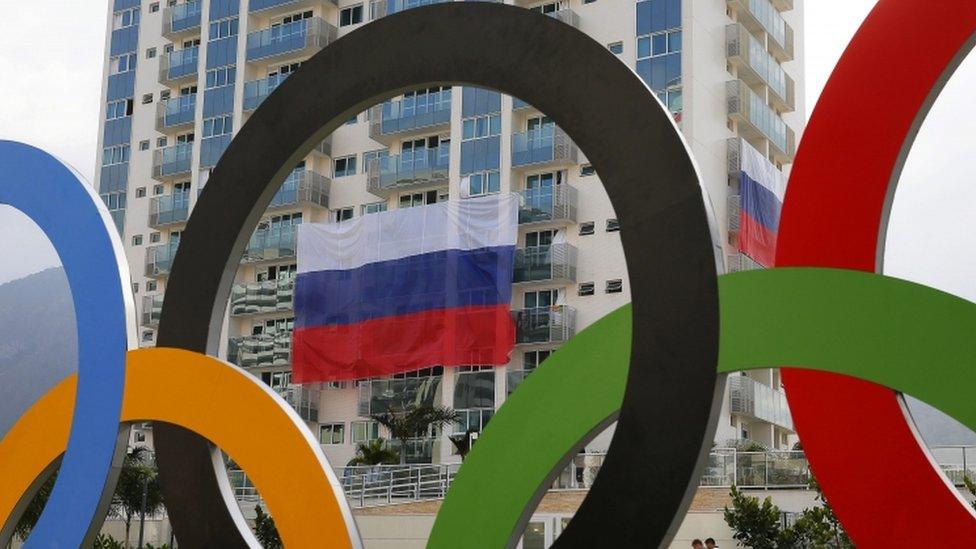McLaren report: Russian doping investigation to announce new findings
- Published
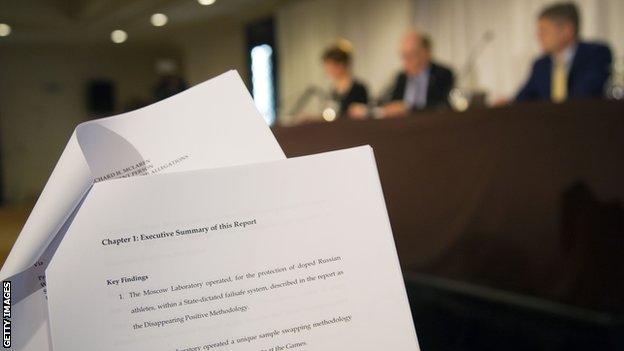
US Anti-Doping chief Travis Tygart says the report's publication on Friday morning will be "a defining moment"
When the first McLaren report into doping in Russia was published, it was a seismic moment but had been months in the making.
When the world heard about disappearing positive drug tests secreted through "mouse holes" drilled by spies it sparked political turmoil, and saw hundreds of Russian athletes banned from Rio 2016.
That was just part one. Part two is to be published on Friday.
The report is named after its author, Dr Richard McLaren, who was tasked by the World Anti-Doping Agency (Wada) with examining allegations made by the former head of Russia's national anti-doping laboratory.
He concluded that Russia had employed a state-sponsored doping programme for four years from 2011, described by others as "an unprecedented attack on the integrity of sport".
Athletics has certainly had a turbulent ride since allegations of systematic doping in Russia first surfaced in a German TV documentary in December 2014.
The ex-president of its governing body is under criminal investigation and cannot leave France, while Interpol has issued a "Red Notice" for the arrest of his son, who is believed to be in Senegal.
After Wada began to publish its findings, two former senior Russian anti-doping officials died unexpectedly, another fled to the United States, while a whistleblower Russian athlete in hiding had her 'location data' hacked.
US Anti-Doping chief Travis Tygart says Friday morning, when we learn even more, will be "a defining moment".
So how did all this begin?
Russia doping crisis in 60 seconds
December 2014
4: As many as 99% of Russian athletes are guilty of doping, a German TV documentary alleges.
The documentary, shown by Das Erste, also alleges the International Association of Athletics Federations (IAAF) has been covering up the abuse.
Then-Russian Athletics Federation president Valentin Balakhnichev describes the claims as "a pack of lies"., external He threatens legal action in response to the "slanderous allegations".
16: Wada announces a three-man Independent Commission will "determine the accuracy", external of the allegations. It will be almost a year before they publish their findings.
November 2015
5: Shortly before the Wada-commissioned report is published, French prosecutors announce ex-International Association of Athletics Federations (IAAF) president Lamine Diack is under investigation.
They suspect Diack of receiving money in 2011 for deferring sanctions against Russian drugs cheats.
9: Wada's independent commission publishes its findings. It says Russia should banned from athletics and also implicates the IAAF.
Russia is accused of running a "state-supported" doping programme that includes "cover-ups and the destruction of samples in anti-doping laboratories".
Interpol says it will coordinate a French-led global investigation into doping allegations in athletics.
Diack is alleged to have received more than £700,000 in bribes in 2011 to cover up positive doping tests by Russian athletes, French prosecutors say.
10: The Russian Anti-Doping Agency (Rusada) dismisses Wada's Independent Commission report.
Executive director Nikita Kamaev says its findings are "possibly politicised".
11: Russia's President Vladimir Putin reacts to the report.
"I agree that this is not only a Russian problem," he says. "But if our international colleagues have questions, we must resolve them."
However, Russian sports officials continue to deny "systemic" and "state-sponsored" cheating.
13: Russia's athletics federation is provisionally suspended from international competition - including the Olympic Games - for its alleged involvement in widespread doping.
26: Russia accepts the IAAF ban. The country's athletics federation says it will co-operate "fully and actively" in order to be reinstated.
January 2016
14: Wada's Independent Commission publishes the second part of its report.
It says ex-IAAF president Diack was "responsible for organising and enabling the conspiracy and corruption that took place in the IAAF".
The report says "corruption was embedded in the organisation" and "cannot be ignored or dismissed as attributable to the odd renegade acting on his own".
February 2016
15: Former Rusada executive director Nikita Kamaev dies, having resigned following Russia's doping scandal. Rusada said the cause of death was "a massive heart attack".
April 2016
21: The IAAF says it will meet in May to assess whether Russia has done enough to warrant being reinstated in time for August's Olympic Games in Rio.
May 2016
9: New allegations about doping in Russia emerge. Former anti-doping agency worker Vitaly Stepanov claims Russian spies posed as anti-doping staff to cover up cheating at the Sochi 2014 Winter Olympics.
12: Stepanov's claims are corroborated by the former director of a Moscow anti-doping lab which is at the centre of the new claims.
Grigory Rodchenkov, who has left Russia for Los Angeles because of concerns over his safety, tells the New York Times, external there was a government-backed system of doping athletes to guarantee Olympic success that "was working like a Swiss watch".
13: Following the new claims, the International Olympic Committee asks Wada to "investigate immediately". But two athletes named by Rodchenko say his claims are "nonsense and slanderous".
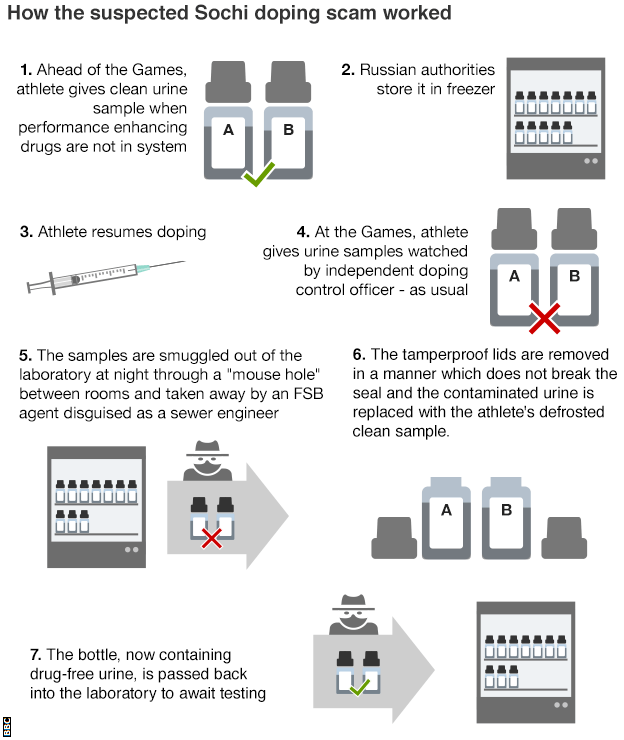
June 2016
17: The IAAF upholds its ban on all Russian track and field athletes, meaning they will not be allowed to compete the Olympics.
July 2016
18: Canadian lawyer Richard McLaren publishes his report into the allegations of state-sponsored cheating in Russia, alleging the country operated a doping programme across four years from late 2011.
It details the "Disappearing Positive Methodology" by which Russian secret agents ensured positive samples were replaced with clean ones. He also calls for all Russian athletes to be banned from Rio 2016.
19: Russia President Putin says the McLaren report represents a "dangerous slide towards political interference in sport," the Moscow Times reports. , external
Referring to Rodchenkov, Putin says claims the allegations stem from "one man with a scandalous reputation".
21: Russia fails to overturn the international ban on its track and field athletes following an appeal to the Court of Arbitration for Sport.
24: The IOC decides not to impose a blanket ban on Russia competing at the Olympics, instead leaving individual sporting federations to decide.
Russia eventually takes 271 athletes to the Games, from an original entry list of 389.
25: Wada says it is "disappointed" its recommendation to ban Russia from the Rio Games has been rejected.
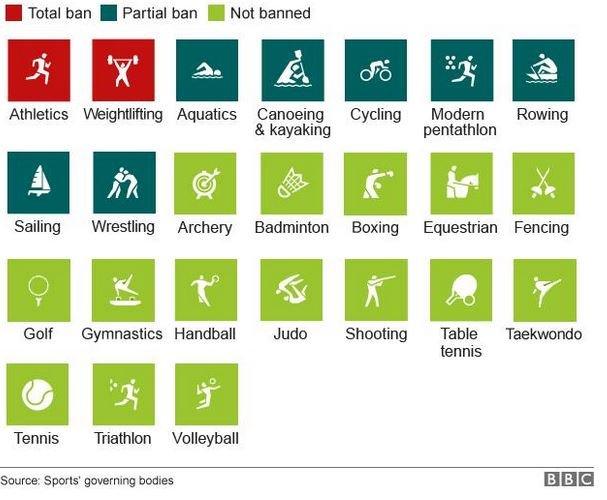
Only the federations for athletics and weightlifting fully banned Russian athletes from competing at Rio 2016
August 2016
8: The International Paralympic Committee bans all Russian athletes from competing at the Rio 2016 Paralympics.
December 2016
7: Doping sanctions against Russia are extended until further notice by the IOC.
- Published18 July 2016
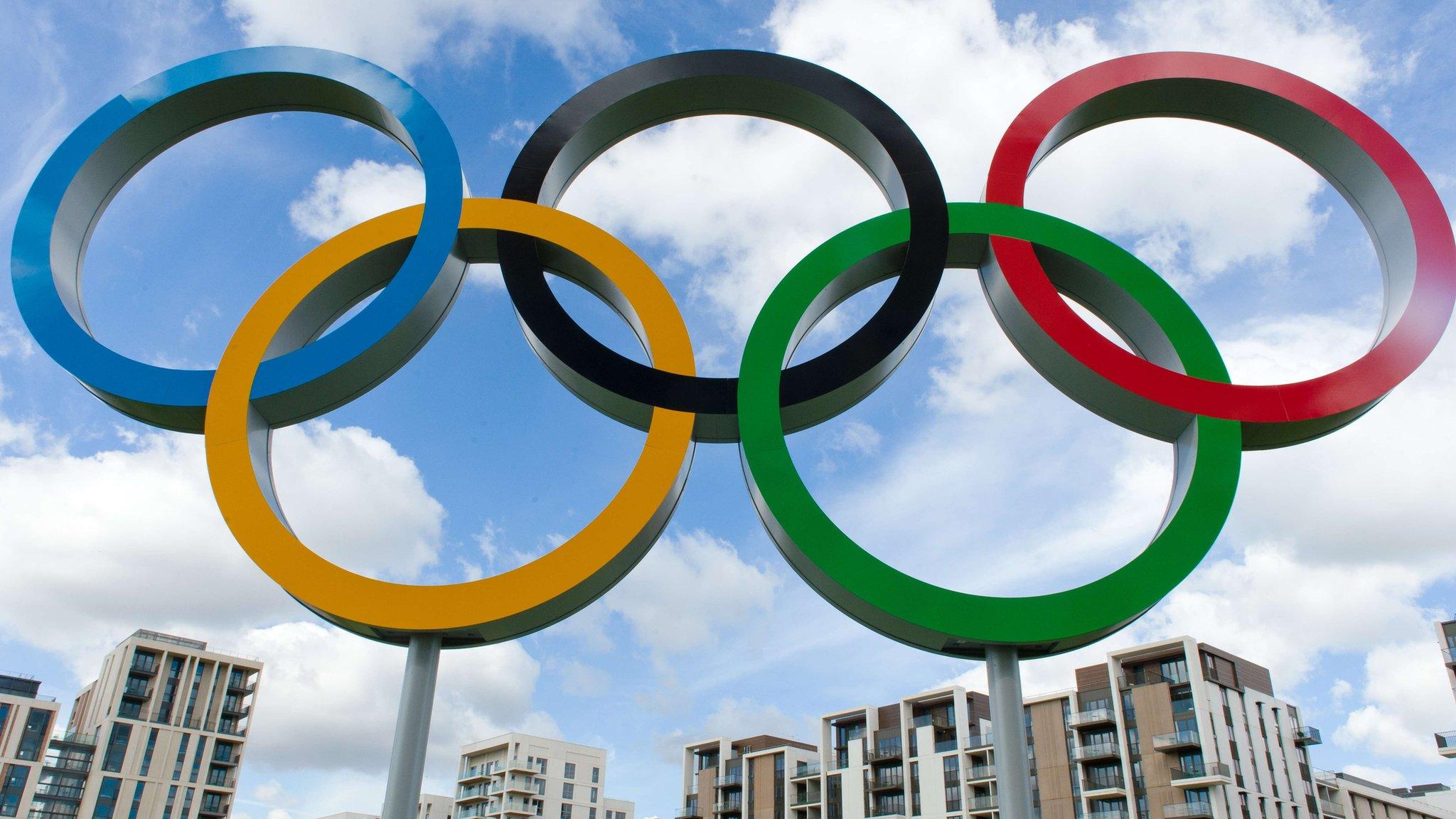
- Published7 December 2016
